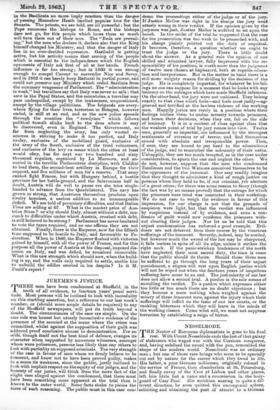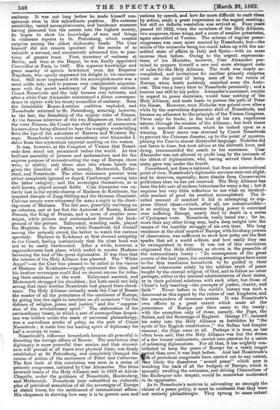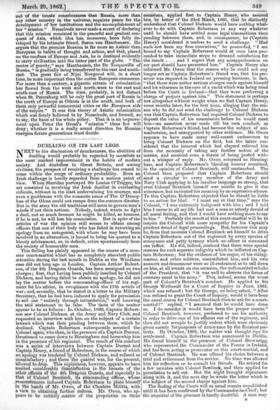NESSELRODE.
THE Nestor of European diplomatists is gone to his final rest. With Count Nesselrode ends the last of that galaxy of statesmen who waged war with the Corsican conqueror, and, having subdued the sword with the pen, remoulded the shape of the modern world. Nesselrode was no ordinary man ; but one of those rare beings who seem to be specially cut out by nature for the career which they tread in life. His father, a poor German nobleman, originally colonel in the service of France, then chamberlain at St. Petersburg, and finally envoy of the Czar at Lisbon and other places, left him little but a name and a commission in the body- guard of Czar Paul. His ambition soaring in quite a dif- ferent direction, he soon quitted this uncongenial sphere, soliciting and obtaining the post .of attaché to a German embassy. It was not long before he made himself con- spicuous even in this subordinate position. His extreme amiability, varied accomplishments, and handsome manners having procured him the entree into the highest society, he began to show his knowledge of men and things in elaborate reports to St. Petersburg, which created surprise among the oldest diplomatic heads. The Czar himself did not remain ignorant of the merits of so valuable a servant, and successively advanced him to posi- tions of greater trust. First, secretary of embassy at Berlin, and then at the Hague, he was finally appointed Councillor at Paris, in 1807. His superior knowledge and great suavity of speech bewitched even the Emperor Napoleon, who openly expressed his delight in his conversa- tion. Still more impressed with his accomplishments was a most noble lady, said to possess very considerable acquaint- ance wIttli the secret machinery of the Imperial cabinet. Count Nesselrode and the lady became very intimate, and after a while Czar Alexander commenced a direct correspon- dence in cipher with his trusty councillor of embassy. Soon the formidable Russo-Austrian coalition exploded, and Nesselrode returned to St. Petersburg, securing, however, to the last, the friendship of the mighty ruler of France. At the famous interview of the two Emperors on the raft of the river Niemen, the Count was chief master of ceremonies, his ears alone being allowed to hear the weighty words falling from the lips of the autocrats of Eastern and Western Eu- rope. Nesselrode's complete ascendancy over Alexander I. dates from this mysterious imperial meeting on the waters.
It was, however, at the Congress of Vienna that Nessel- rode first stood out prominent before the world. At this brilliant assembly of princes and ambassadors, met for the express purpose of reconstructing the map of Europe, there were, in reality, only three men into whose hands was given the direction of affairs, namely, Metternich, Talley- rand, and Nesselrode. The other statesmen present were either completely ignored or duped, Castlereagh coming into the latter category; and the sovereigns themselves, as is well known, played second fiddle. Czar Alexander was en- tirely lost in the mystic charms of Madame de Kriidener, the inspired disciple of Jung Stilling and the German illuminati. Curious scenes were witnessed for many a night in the draw- ing-room of Madame. The fair seer, gracefully reclining on an ottoman, saw at her feet the Autocrat of Russia, Kaiser Francis, the King of Prussia, and a score of smaller sove- reigns, while princes and ambassadors formed the back- ground of the picture. Talleyrand, standing aside, played the liephisto in the drama, while Nesselrode hid himself among the princely crowd, the better to watch the curious spectacle. Madame de Kriidener at first showed antipathy to the Count, feeling instinctively that his clear head was not to be easily bamboozled. After a while, however, a rapprochement took place, which ended in mystic Madame becoming the tool of the great diplomatist. It was then that the scheme of the Holy Alliance was planned. The "White Angel" —as the Czar was pleased to be called in the visions of Madame de Kriidener—eagerly embraced the idea, and his brother sovereigns could find no decent excuse for refus- ing their assistance in the work. Talleyrand sneered, and Metternich shrugged his shoulders ; but both could not help seeing that their brother Nesselrode had played them check- mate. The Holy Alliance virtually made the Czar of Russia the master of all the potentates of the continent of Europe, by giving him the right to interfere on all occasions "for the defence of religion, peace, and justice," and the "suppres- sion of the revolutionary spirit." The elaboration of the extraordinary treaty, in which a sort of cosmopolitan despot- ism was hidden under the mask of universal philanthropy, was a marvellous stroke of policy on the part of Count Nesselrode ; it made him the leading spirit of diplomacy for half a century to come.
Nesselrode's influence henceforth became all-powerful in directing the foreign affairs of Russia. The conviction that diplomacy is more powerful than armies, and that shrewd- ness will prevail at all times over physical force, was firmly established at St. Petersburg, and completely'ehanged the course of action of the successors of Peter and Catherine.
The first fruit of this conviction was seen in a series of princely congresses, initiated by Czar Alexander. The three crowned heads of the Holy Alliance met in 1818 at Aix-la- Chapelle, under the guidance of Nesselrode, Hardenberg, and Metternich. Nesselrode here submitted an elaborate plan of periodical assemblies of all the sovereigns of Europe at stated times, for the settlement of international affairs. His eloquence in showing how easy it is to govern men and nations by speech, and how far more difficult to curb them by action, made a great impression on the august meeting; but still no definite resolution was arrived at. Four years passed till 1822, when the members of the Holy Alliance, two emperors, three kings, and a score of smaller potentates, again assembled at Verona. The scheme of regular peace. congresses was once more mooted by Nesselrode, but—the minds of the monarchs being too much taken up with the un- settled state of affairs in Italy and Spain—with no more success than before. Owing to the urgent representa- tions of his Minister, however, Czar Alexander pro- mised to prepare himself a new and more stringent code of rules for the Holy Alliance. The work was nearly ac- complished, and invitations for another princely congress were on the point of being sent off to the rulers of Europe, when death suddenly snatched away the Auto- crat. This was a heavy blow to Nesselrode personally ; and a heavier one still to his policy. Alexander's successor, sceptic in regard to peace doctrines, would hear nothing of the Holy Alliance, and made haste to pursue the path of Peter the Great. However, even Nicholas was gained over after a while by the marvellous diplomatic skill of Nesselrode, and became an adherent to the principle of the Vienna Congress. Twice only he broke, in the heat of his own impetuous nature, through the meshes of the Alliance ; but both times with a manifest ill-success, which he looked upon as a warning. Every nerve was strained by Count Nesselrode to prevent the Crimean disaster, up to the point of apostro- phizing the Czar in almost dictatorial language. Nicholas did not listen in time, but took advice at the eleventh hour, and dying, recommended the oracle to his successor. Czar Alexander was not allowed to profit long by the counsels of the ablest of diplomatists, who, having served three Auto- crats, gave way under the fourth. Considered, not from a national, but from an international point of view, Nesselrode's diplomatic services were not slight; and he deserves, especially, more thanks from Conservative politicians than he has yet received. The Holy Alliance has been the bete noir of modern historians for many a day ; but it requires but very little reflection to see what an incalcul- able, amoUnt of good its creation accomplished. The li- mited amount of mischief it did in attempting to sup- press liberal ideas—which, after all, are indestructible— is as nothing to the immense healing power it exercised over suffering Europe, nearly bled to death in a series of Cyclopean wars. Nesselrode really hated war ; for he, more than any other living man, had a deep insight into the causes of the horrible struggle of his own time. His long residence at the chief courts of Europe, with his sharp powers of observation, was sufficient to show how petty are the first sparks that set a world a-blaze, and how easily they can be extinguished in time. It was out of this conviction originated the Holy Alliance, as shown in the preamble of the extraordinary treaty : "In consequence of the great events of the last years, the contracting sovereigns have come to the firm resolution henceforth to be guided in their mutual intercourse solely by the sublime truth of peace taught by the eternal religion of God, and to follow no other precepts, either in the internal administration of their states, or in their political relations with each other, but those of Christ's holy teaching—the precepts of justice, charity, and faith." Never before in the world's history was such a document as this signed by the rulers of vast kingdoms, and the commanders of immense armies. It was Nesselrode's own efforts to a great extent which made all the potentates of Europe put their name to the treaty ; with the exception only of three, namely, the Pope, the Sultan, and the Sovereign of England. George IV. excused his entry into the Holy Alliance as forbidden by "the spirit of the English constitution ;" the Sultan had simpler reasons ; the Pope none at all. Perhaps it is true, as has often been said, that the Holy Alliance was but the dream of a few honest enthusiasts, carried into practice by a union of scheming diplomatists. For all that, it has mightily con- tributed to keep the peace of Europe for a vastly longer nod than ever it was kept before. And had Nesselrode's eti of periodical congresses been carried out to any extent, y likely the disastrous "armed peace" which now is breaking the back of all the budgets of Europe, which is annually swelling the estimates, and driving Chancellors of the Exchequer into despair, would be somewhat moderated in its oppression. As to Nesselrode's motives in advocating so strongly the claims of a peace policy, it must be confessed that they were not entirely philanthropic. They sprung to some extent out of the innate consciousness that Russia, more than any other country in the universe, requires peace for the development of her institutions and the accomplishment of her "mission." Nesselrode never made a secret of declaring that this mission consisted in the peaceful and gradual con- quest of Asia, which idea has, moreover, been fully de- veloped by his intimate friend, Baron von Haxthausen. He argueti that the genuine Russian is far more an Asiatic than European in habits of thought and action, and that, placed on the confines of Europe and Asia, he is destined evidently to carry civilization into the latter part of the globe. "The centre of gravity," says Haxthausen, the Be Tocqueir1110 of Russia, "is gradually being transferred to the east and south- east. The great fair of Nijni Novgorod will, in a Short One, be mere important than the entire European commerce. For More than a century, a gigantic stream of colonization hat flowed from the west and north-west to the east and south-east of Russia. The time, probably, is hot distant when St. Petersburg will be only the great port of Russia in the north of Europe at Odessa is in the south, and both of them Only powerful commercial cities on the European ride of the empire." It was this theory of Asiatic colonization which was firmly believed Hi by Nesselkode, and formed, so to say, the basis of his whole policy. That it is an improve- ment upon Peter the Great's " mission" ideas few will deny ; Whether it is a really sound direction for Russian energies future generations Mint decide.
































 Previous page
Previous page